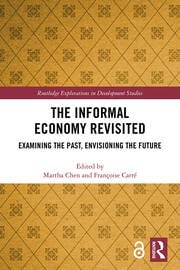The Informal Economy Revisited: Examining the Past, Envisioning the Future
Contributors bridge a range of disciplinary perspectives including anthropology, development economics, law, political science, sociology, statistics, and urban planning and design. The Informal Economy Revisited, which is the culmination of 20 years of pioneering work by WIEGO, also focuses on specific groups of informal workers to provide a grounded insight into disciplinary debates. Ultimately, the book calls for a paradigm shift in how the informal economy is perceived to reflect the realities of informal work in the Global South, as well as the informal practices of the state and capital, not just labour.
This comprehensive and up-to-date book, with contributions from a wide range of disciplines, is essential reading for everyone interested in work, employment and development. It demonstrates that it is not through the wage that most workers in the world relate to capital and to the state, but through a variety of forms of self-employment, own account work, and work as contributing family members. It covers innovations such as the new status category in labour statistics of ‘dependent contractor’, which captures more accurately the situation of the majority of outworkers, home-based workers, and ‘gig’ workers. It debunks myths, such as that the informal economy does not pay tax. It argues that bypassing rules and regulations is not unique to the informal economy but is also characteristic of businesses in the formal economy. It shows that informal workers can make gains through organising and that social protection and labour standards can be designed in ways appropriate for securing justice for informal workers. It sets out a compelling case for a paradigm shift in how the informal economy is understood, and for ‘decolonising’ policies and laws for the informal economy. – Diane Elson, Emeritus Professor, University of Essex, UK. Member of UN Committee for Development Policy
View list of all: Books & Book Chapters

